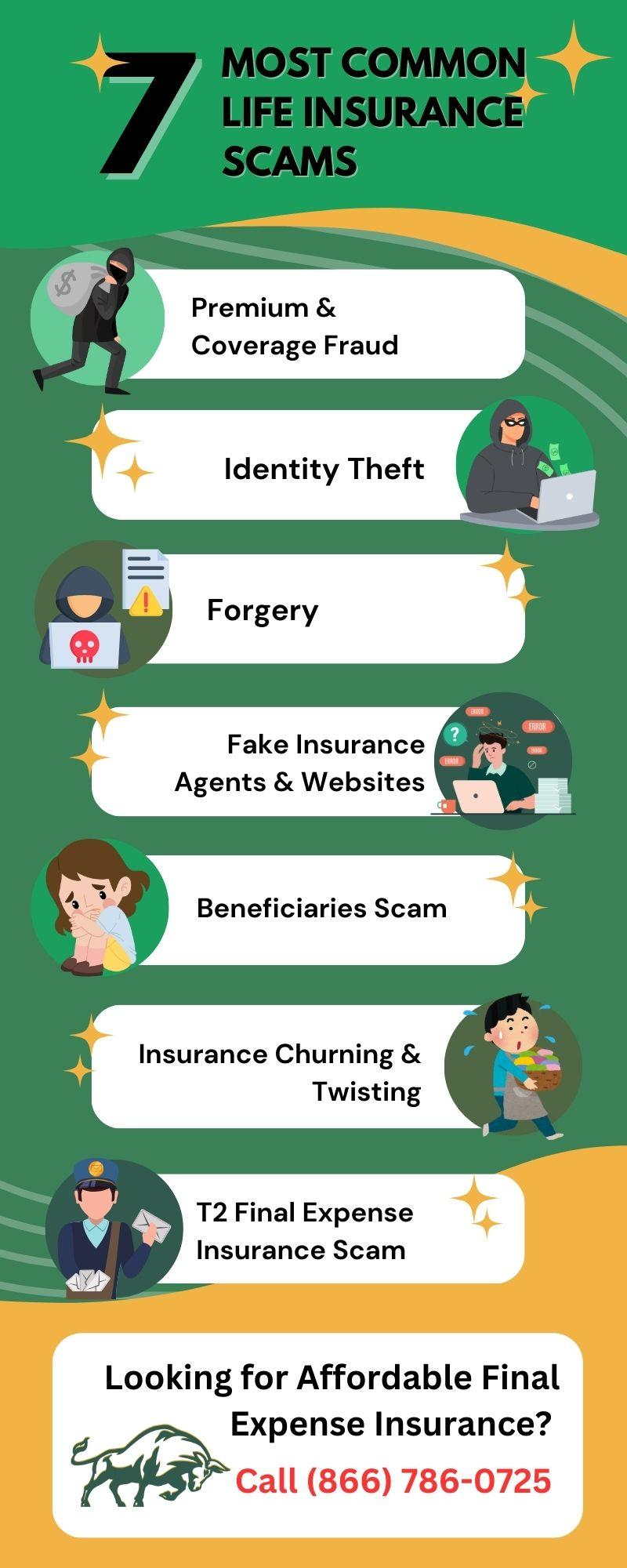
The Most Common Life Insurance Scams You Need To Know
Updated on Jan 15, 2025 • 4 min read
You’ve probably heard of some extreme life insurance scams on the news. Articles and late-night reports of people taking out multiple life insurance policies on family members and trying to harm them for it. Or faking their death to get a cut of their beneficiary’s payout. While all of these instances of fraud occur, final expense insurance scams tend to be more subtle.
Final expense insurance scams target unsuspecting seniors or grieving family members to steal their hard-earned money. Luckily, there are ways you can tell if someone is trying to scam you and ways to protect yourself and your loved ones.
If you’re interested in these or any of our other life insurance options, call us at (866) 786-0725 to learn more. Be sure to check our free online quoting tool for personalized pricing estimates.
How Do Life Insurance Scams Work?
Life insurance scams or fraud occurs when there is deceitfulness or malintent with an insured, policyholder, or beneficiary. It could also be when one tries to falsify or intentionally withhold information. Final expense insurance scams cost the average family up to $700 annually in increased monthly premium amounts.
Keep in mind that most life insurance agencies, brokers, and companies are not scams, and whole life insurance can be remarkably useful for paying off medical, funeral, and final expenses that can be left behind.

Most Common Life Insurance Scams

Premium & Coverage Fraud
Premium and coverage fraud is when an “agent” comes to someone seeking final expense insurance with a series of questions mimicking the medical questionnaire you could be asked. Once you fall for their tricks and send in your monthly premium, they will pocket the money instead of giving you a policy. Your beneficiaries will be left with nothing and the fake agents will pocket those premiums themselves.
Protecting yourself from this scam requires reviewing the policy you agree to and determining if it is legitimate.
Identity Theft
If you’ve already received your insurance policy and are contacted by your insurance provider, confirm who they are before providing any information. Identity thieves will pretend they are coming from your insurance provider and ask for your private information (Social Security number, credit card information, etc.).
Always ask for validation or ask to continue working with the agent that you were working with previously to prevent your identity from getting stolen.
Forgery
If you’re connected to a shady insurance agent, they will take your signature and use it to make changes or apply to additional policies without you knowing. They can even add insurance riders to your policy to meet a quota. Most insurance agents are ethical people who take their roles seriously, so it is rare for you to interact with or experience this kind of scam.
Review your policy when you submit your application, and check the charges on your account to ensure you aren’t being charged more than you were quoted for.

Fake Insurance Agents & Websites
Fake insurance agents will set up websites claiming they are insurance sales agents or a team of agents looking for unsuspecting seniors to enter their personal information on the site. Oftentimes, scam websites won’t even sell you anything — they just want your information to use for their gain.
Beneficiaries Scam
Phishing is a scam where a stranger pretends to be from a reputable source through a messaging platform. They always ask for information that can be used to access your accounts which is exactly how beneficiary life insurance scams work.
Scammers prey upon those who recently lost a loved one and will contact them saying that they are entitled to death benefits from a phony policy. They will state that if you want to receive the death benefit, you’ll need to pay for any outstanding premiums and promise millions of dollars once you “pay the $1,000 premium deficit”.
Insurance Churning & Twisting
Churning and twisting are two different life insurance scams that cause policyholders to have less coverage at higher premiums. Essentially, the insurance agent who will contact you prioritizes commission sales over finding your best policy. Here is an example of churning and twisting:
- Churning: You have ABC insurance with the level policy plan. The agent tries to get you to switch to ABC Insurance’s moderated policy plan. This would decrease coverage with the same carrier for you and the agent would get a commission for making a sale.
- Twisting: You have DEF insurance with the level policy plan. The agent tries to get you to switch to ABC Insurance’s level or moderate policy plan. This could result in a higher premium for you with less coverage but a commission bonus for the agent.
Again, most agents are ethical people devoted to their jobs, but there are rare circumstances that will try to call you to get a commission bump. Some states have regulations discouraging agents from doing this, but it isn’t completely illegal.
T2 Final Expense Insurance Scam
The T2 Free Final Expense Insurance Scam comes in the form of an official-looking letter that looks like it’s coming from the government. However, this is just a ploy to get your information and consent to send you endless letters and phone calls asking you to sign up for their final expense insurance policies.
While you can get a life insurance policy from these mailers, it’s important to note that there are easier ways to get the best insurance policy. Our recommendation is to call one of our agents. Call us at (866) 786-0725 to be connected today.
What To Do if You Are a Victim of a Life Insurance Scam
The Coalition Against Insurance Fraud provides you with each state agency that can assist you in filing a claim. Next, you may have to file a police report with the authorities for them to investigate. The report will go to your state or city’s Financial and Cyber Crimes unit. Try to provide them with as much detailed information as possible phone numbers, emails, or websites the scammer used to get your information.
If you bought insurance from a licensed agent and suspect you are a victim of churning or twisting you will be able to cancel your policy during the cancellation period at no penalty to you. All life insurance policies have a period when you can get a full refund. Each policy is different, so check your policy to ensure you can leave when you like.
How to Protect Yourself From Life Insurance Scams
1
Fill Out Applications Carefully
When you apply for a new life insurance policy, you will be asked to submit a lengthy application. The applications look to see what type of health conditions you may have or what your credit will look like.
Review all questions carefully, answer honestly, and take your time filling out the application.
Rushing through the application could lead you to write down incorrect information. While minor mistakes may be overlooked, you do not want to make an error that could get your coverage denied.
2
Stay Informed
Keeping up-to-date with how scammer operates can be a great way to protect yourself from becoming their next victim. Fraudsters are always evolving and figuring out new means to scam vulnerable people out of their money. Here are key pieces of information to remember when it comes to life insurance scams:
- Life insurance websites never ask for your social security number or credit card information. This is reserved for the application.
- Agents can verify themselves by telling you their license number or National Producer Number (NPN). If they refuse or are reluctant to give this information, that is a red flag.
- Agents will never inform you of a missed payment and try to have you correct that with a phone call. Call the insurance company directly if you suspect you missed a payment.
- If your loved one with a life insurance policy has passed, the insurance company must be informed first to contact beneficiaries. Legitimate companies will never contact you without notice but someone pulling a life insurance scam might.
- Companies will never tell you that a premium payment is necessary to receive death benefits. Death benefits can only be given if the policyholder made all payments up to their death.
3
Review Your Policy
Be sure to get a copy of and read through the insurance policy that you are buying. Review the cancellation terms and determine how much time you have to receive a full refund if you are unhappy with the services you have received.
Ask questions about anything you don’t understand. A reputable company is happy to help you and clear up any confusion. People running life insurance scams will not provide you with any details, or paperwork, nor would they want to answer any questions you may have.
4
Work with Reputable & Licenced Insurance Agents
Working with agents and companies you can trust is crucial. Final Expense Benefits adheres to a strict code of ethics to ensure you are treated fairly and with the utmost respect and care you deserve.
We are committed to protecting your legacy and loved ones by connecting you to over 20 of the best insurance carriers. We pledge to provide superior customer service, supply you with the highest quality insurance at the lowest cost, and give you peace of mind that all your final expense needs are delicately and thoughtfully taken care of.
Conclusion
Plenty of life insurance scams out there want your information to gain access to your bank accounts and steal your identity. Luckily, if you work with a reputable insurance broker company, like Final Expense Benefits, you can avoid all the scams and get the most affordable life insurance with the best coverage options.
Final Expense Benefits only works with the top-rated insurance providers, including…
… Just to name a few! Call one of our agents to receive a policy with one of the top-rated insurance companies in the nation. We are committed to finding a policy that gives you the best coverage at affordable prices. Our number is (866) 786-0725, and our talented agents are available every weekday from 9 a.m. to 5 p.m. ET to discuss your final expense needs.
We also have a free quoting tool that can give you an accurate estimate of the coverage you can expect to pay with the monthly premium costs.
Frequently Asked Questions
How Do Life Insurance Scams Work?
Life insurance scams will ask for your personal information, like your social security number and credit card information. You should never give your information away if you cannot confirm a valid source.

